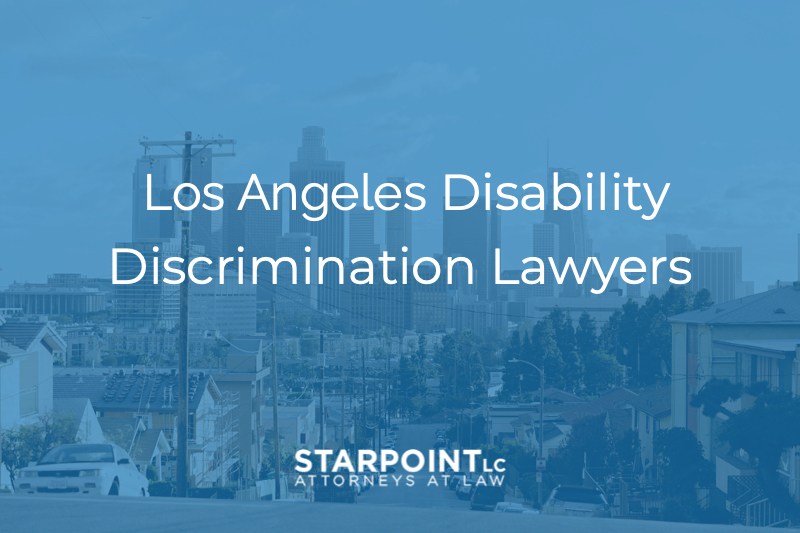
Discrimination in the workplace can take many forms.
Laws such as the California Fair Employment and Housing Act (FEHA) and Americans with Disabilities Act (ADA) prohibit discrimination against employees based on real or perceived disability.
No one chooses to have a disability.
If you believe an employer has treated you unfairly, you may want to seek the help of Los Angeles disability discrimination attorneys who have experience with California employment law regulations.
What Is Disability Discrimination?
Receiving unfair treatment because of an actual or perceived disability constitutes disability discrimination.
California employees are protected from disability discrimination in the following stages of an employment relationship:
- Application process,
- Interview of the applicant,
- Hiring process,
- Wage and benefit determination,
- Disciplinary action or suspension,
- Termination of employment, and
- Harassment or hostile working environment.
Those who are able to do their essential job functions and have a disability should be treated equally under the law.
A Los Angeles disability discrimination attorney will be able to help you determine if you have a case given your employment situation.
Employees Entitled to Protection From Disability Discrimination
Some physical disabilities are easy to recognize—for example, those that require a wheelchair for mobility or involve sensory perception such as blindness or deafness.
But not all disabilities are physical, nor are they obvious. California has a broad definition of disability which includes physical disability, mental disability, and medical conditions.
Physical Disability
Under the FEHA, a physical disability can consist of a physiological disease, disorder, condition, cosmetic disfigurement, or anatomical loss that affects one or more major body systems and limits a life activity, such as working.
Some specific conditions included in the FEHA are cerebral palsy, HIV/AIDS, epilepsy, diabetes, multiple sclerosis, and others.
Mental Disability
A mental disability in California can be any mental or psychological disorder or condition. Some examples include organic brain syndrome, emotional or mental illness, or specific learning disabilities.
These mental disabilities must limit a major life activity or require special education or related services. Conditions such as autism, schizophrenia, bipolar disorder, and PTSD fall under mental disability.
Medical Condition
Any health impairment related to or associated with a diagnosis of cancer, a record or history of cancer, or a genetic characteristic constitutes a medical condition disability in California.
Differences Between the ADA and FEHA
The main difference between the ADA and the FEHA is that the FEHA will usually provide more protection for California disabled employees than the ADA.
The definition of “disability” in California under the FEHA is broader than it is under the ADA. When this is not the case, the FEHA incorporates the broader definition so that coverage is always at least equivalent to the coverage provided by the ADA. The FEHA does not limit the amount of damages an employee can recover in a civil case.
More employers in California are subject to California anti-discrimination law than are subject to federal law. The employment provisions of the FEHA apply to employers with five or more full- or part-time employees, but the ADA applies only to employers with at least 15 employees.
Because the FEHA grants more rights to employees than does the ADA, it is often advisable for employees to pursue relief under the FEHA instead of the ADA. A Los Angeles disability discrimination lawyer can help you determine the best course of action for your potential case. An employer’s obligation to provide reasonable accommodation for an employee with a disability is broader in California than in many other places. However, the ADA does federally mandate reasonable accommodations in all jurisdictions.
Recovery for Disability Discrimination
The purpose of filing a lawsuit is to receive or “recover” compensation. This compensation should restore you back to the same place you would have been had it not been for the discriminatory action of your employer. Some potential awards may include:
- Recovery of lost wages,
- Reinstatement of your position,
- Recovery of employment benefits,
- Compensation for emotional distress,
- Punitive damages, and
- Attorney fees.
The type of recovery you receive for disability discrimination in California will be unique to your individual case.
Los Angeles Disability Discrimination Attorneys
Whether it is because of a disability or for any other reason, no one should have to face discrimination or an unhealthy working environment. The Los Angeles disability discrimination attorneys at Startpoint Employment Law understand how stressful this experience can be. We understand the intricacies of California employment law and will fight for your rights as an employee. Contact Starpoint Employment Law to find out how we can help.
